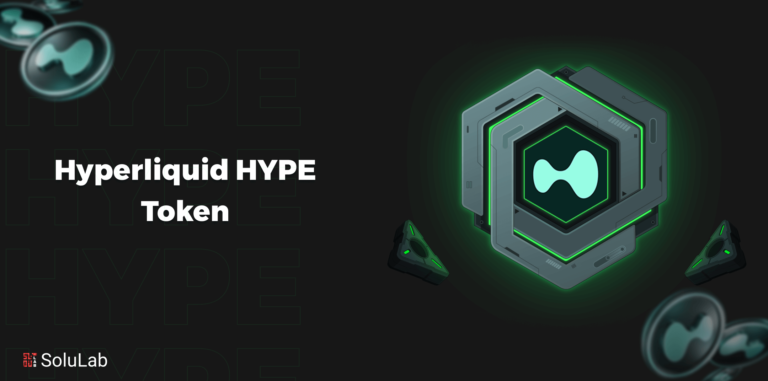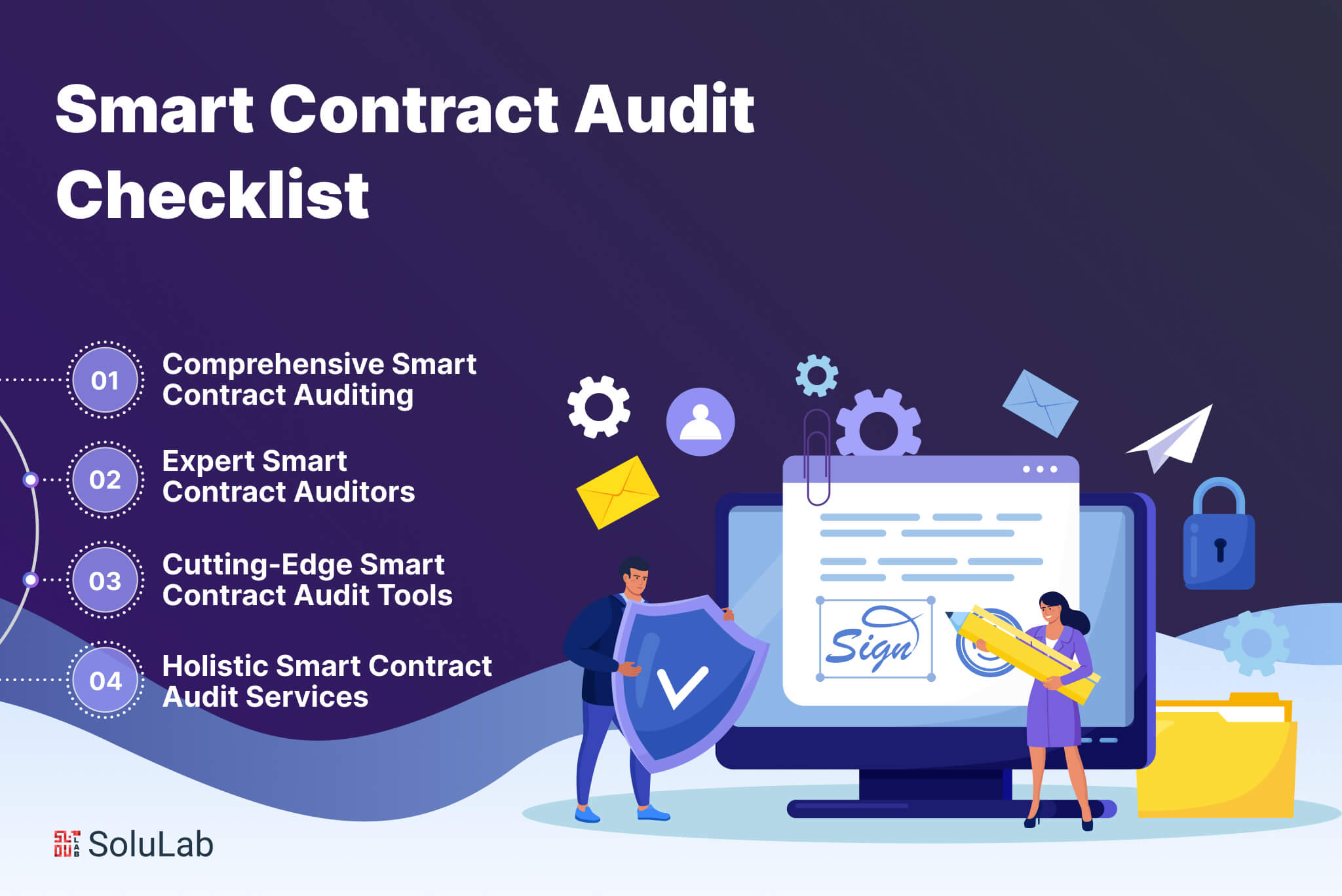
In the rapidly evolving landscape of blockchain technology, smart contracts have emerged as a revolutionary concept, transforming the way agreements are executed in a decentralized and secure manner. This paradigm shift introduces the need for meticulous evaluation and validation, giving rise to the crucial practice of smart contract audits.
Smart contracts are self-executing agreements with the terms of the contract directly written into code. These contracts run on blockchain networks and automatically enforce and execute the agreed-upon terms when predefined conditions are met. By eliminating the need for intermediaries, smart contracts enhance transparency, reduce costs, and mitigate the risk of fraud.
The dynamic nature of blockchain ecosystems and the complexity of smart contract code necessitate comprehensive audits. Smart contract audits play a pivotal role in ensuring the reliability and security of these digital agreements. Audits are conducted to identify vulnerabilities, bugs, or potential exploits in the code that could compromise the integrity of the smart contract and its underlying blockchain network.
How do Smart Contracts Work?
Smart contracts, a cornerstone of blockchain technology, have revolutionized the way transactions are executed, bringing transparency, security, and automation to various industries. Understanding the basics of smart contracts is essential for navigating this innovative landscape.
1. Basics of Smart Contracts
Smart contracts are self-executing contracts with the terms of the agreement directly written into code. Built on blockchain platforms like Ethereum, these contracts utilize the decentralized nature of blockchain to eliminate the need for intermediaries, such as banks or legal authorities.
The smart contract is deployed to the blockchain when parties agree on specific conditions. It automatically enforces and executes the terms when predefined conditions are met. The execution process is trustless, meaning it occurs without reliance on a central authority, enhancing efficiency and reducing costs.
-
Smart Contract Audit
Before deployment, smart contracts undergo rigorous auditing processes to ensure their security and functionality. Smart contract audits involve a comprehensive review of the code, identifying vulnerabilities and potential exploits. This critical step ensures that the smart contract behaves as intended and mitigates the risk of exploited vulnerabilities.
2. Common Use Cases
Smart contracts find applications in various industries, streamlining processes and enhancing security. Some common use cases include:
-
Financial Services
Facilitating automatic payments, loans, and insurance payouts without intermediaries.
-
Supply Chain Management
Automating and securing the supply chain process by enforcing contract terms at each stage.
-
Real Estate
Simplifying property transactions through automated escrow and title transfers.
-
Token Offerings
Managing initial coin offerings (ICOs) and token sales transparently and securely.
-
Legal Agreements
Executing and enforcing legal agreements automatically when predefined conditions are met.
-
Smart Contract Auditing Services
Various companies offer smart contract audit services to address the increasing importance of security in smart contracts. These services employ sophisticated tools to analyze code, identify vulnerabilities, and ensure compliance with industry best practices. Choosing a reputable smart contract audit company is crucial to maintaining the integrity of the contract.
3. Risks Associated with Smart Contracts
While smart contracts offer numerous advantages, they are not without risks. Common risks include:
-
Coding Errors
Bugs or vulnerabilities in the code can lead to unintended consequences.
-
Oracle Issues
Reliance on external data (oracles) can introduce vulnerabilities if the data source is compromised.
-
Immutability
Once deployed, it’s challenging to modify smart contracts, potentially leading to issues if errors are discovered.
-
Legal Uncertainties
Legal recognition and enforcement of smart contracts vary globally, posing challenges in certain jurisdictions.
-
Smart Contract Audit Tools
To mitigate these risks, developers use smart contract audit tools. These tools analyze the code for vulnerabilities, ensuring a robust and secure implementation. Engaging in smart contract auditing is a proactive measure to enhance the reliability of the code and protect against potential exploits.
What is the Significance of Auditing Smart Contracts?
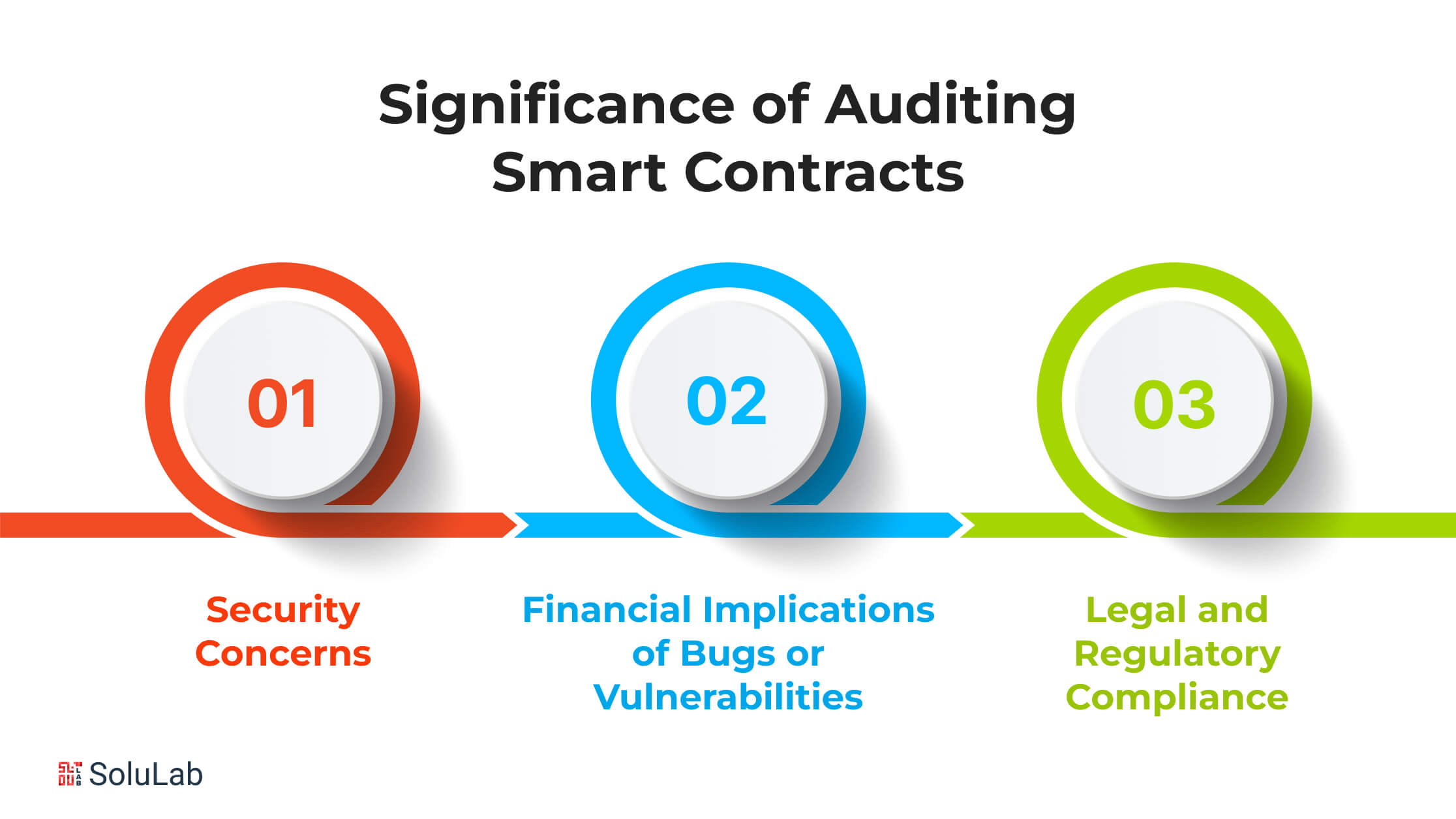
In the realm of blockchain technology, smart contracts have emerged as a revolutionary tool, automating and executing agreements without the need for intermediaries. However, the unchecked deployment of smart contracts can pose serious risks, making the importance of auditing these digital agreements paramount. This article explores the multifaceted significance of auditing smart contracts, delving into security concerns, financial implications, and legal and regulatory compliance.
1. Security Concerns
Smart contracts operate within a decentralized and transparent environment, making them susceptible to security vulnerabilities. Unscrupulous actors exploit weaknesses in coding, leading to potential breaches and unauthorized access. To mitigate these risks, smart contract auditing becomes a crucial step in ensuring the robustness of the code.
By employing advanced smart contract audit tools, developers can identify and rectify vulnerabilities, ensuring the integrity and security of the digital agreements. A thorough audit not only protects sensitive data but also prevents potential exploits that could compromise the entire blockchain network.
2. Financial Implications of Bugs or Vulnerabilities
Undetected bugs or vulnerabilities in smart contracts can have severe financial repercussions. The decentralized nature of blockchain transactions means that once a smart contract is deployed, it becomes immutable. Therefore, any flaws in the code can lead to financial losses, impacting both users and stakeholders.
Smart contract auditing serves as a financial safeguard, helping identify and eliminate bugs before deployment. By engaging a reputable smart contract audit company, organizations can safeguard their financial interests, prevent potential exploitation, and build trust among users in the blockchain ecosystem.
3. Legal and Regulatory Compliance
In an era where digital transactions are becoming more prevalent, legal and regulatory compliance is paramount. Smart contracts, while offering efficiency, must adhere to existing legal frameworks to ensure the validity of agreements.
Smart contract auditing extends beyond code analysis, encompassing a comprehensive review of legal and regulatory compliance. Ensuring that digital agreements align with existing laws mitigates legal risks and fosters a trustworthy environment for all stakeholders involved.
What are the Key Components for Smart Contract Auditing?
In the realm of smart contract development, ensuring the reliability, security, and efficiency of code is paramount. The Ultimate Checklist for smart contract auditing comprises crucial components that developers and auditors must meticulously examine to guarantee the robustness of their smart contracts.
A. Code Review
-
Best Practices
When conducting a code review, adherence to industry best practices is non-negotiable. This involves assessing whether the code aligns with established standards, promoting maintainability and readability.
-
Code Structure
The structure of the code can significantly impact its performance and ease of maintenance. Evaluating the organization and modularity of the code is crucial for identifying potential vulnerabilities.
-
Error Handling
A thorough examination of error-handling mechanisms is vital to prevent unforeseen issues. Auditors focus on how gracefully the code handles unexpected situations, minimizing the risk of exploitation.
B. Security Considerations
-
Vulnerability Assessment
A comprehensive vulnerability assessment is conducted to identify and address potential threats. Specialized tools are often employed to detect vulnerabilities and weaknesses that could compromise the security of the smart contract.
-
Secure Design Principles
Evaluating adherence to secure design principles ensures that the smart contract is resistant to common attack vectors. This includes secure data handling, input validation, and secure state transitions.
-
Authentication and Authorization
Robust authentication and authorization mechanisms are scrutinized to ensure that only authorized entities can interact with the smart contract. This is crucial for preventing unauthorized access and manipulation.
C. Gas Optimization
-
Gas Fees and Efficiency
Assessing gas fees and efficiency is vital for optimizing the cost-effectiveness of smart contracts. Developers aim to minimize gas consumption while maximizing functionality to enhance the economic viability of the contract.
-
Gas Limit Considerations
Analyzing gas limit considerations involves ensuring that the contract operates within the specified gas limits on the blockchain. This prevents unforeseen issues such as out-of-gas errors during contract execution.
-
Strategies for Optimization
Implementing optimization strategies involves fine-tuning the code to enhance performance and reduce gas consumption. This ensures that the smart contract functions efficiently and economically on the blockchain.
D. Testing Procedures
-
Unit Testing
Rigorous unit testing is performed to validate the functionality of individual components. This helps identify and rectify issues at an early stage, ensuring the overall integrity of the smart contract.
-
Integration Testing
Integration testing assesses the interactions between various components to ensure seamless operation. This phase verifies that different sections of the smart contract work cohesively together.
-
Scenario Testing
Scenario testing involves simulating real-world scenarios to evaluate the smart contract’s behavior under diverse conditions. This helps identify potential vulnerabilities and ensures the contract’s robustness in practical usage.
E. Documentation
-
Comprehensive Documentation Standards
Thorough and clear documentation is crucial for facilitating understanding and maintenance. The documentation should cover the smart contract’s functionality, structure, and any specific considerations for auditors.
-
Comments and Annotations
Well-placed comments and annotations within the code enhance readability and comprehension. Auditors assess the presence of descriptive comments that explain complex logic, making the code more accessible for review.
-
Version Control
Utilizing version control systems ensures traceability and provides a historical perspective on code changes. Auditors review version control practices to ensure a systematic approach to code modifications.
In the ever-evolving landscape of blockchain technology, undergoing a smart contract audit is imperative. Engaging with a reputable smart contract audit company equipped with cutting-edge smart contract audit tools and services ensures a meticulous examination of these checklist components, promoting the development of secure and efficient smart contracts.
What are the Auditing Tools and Technologies?
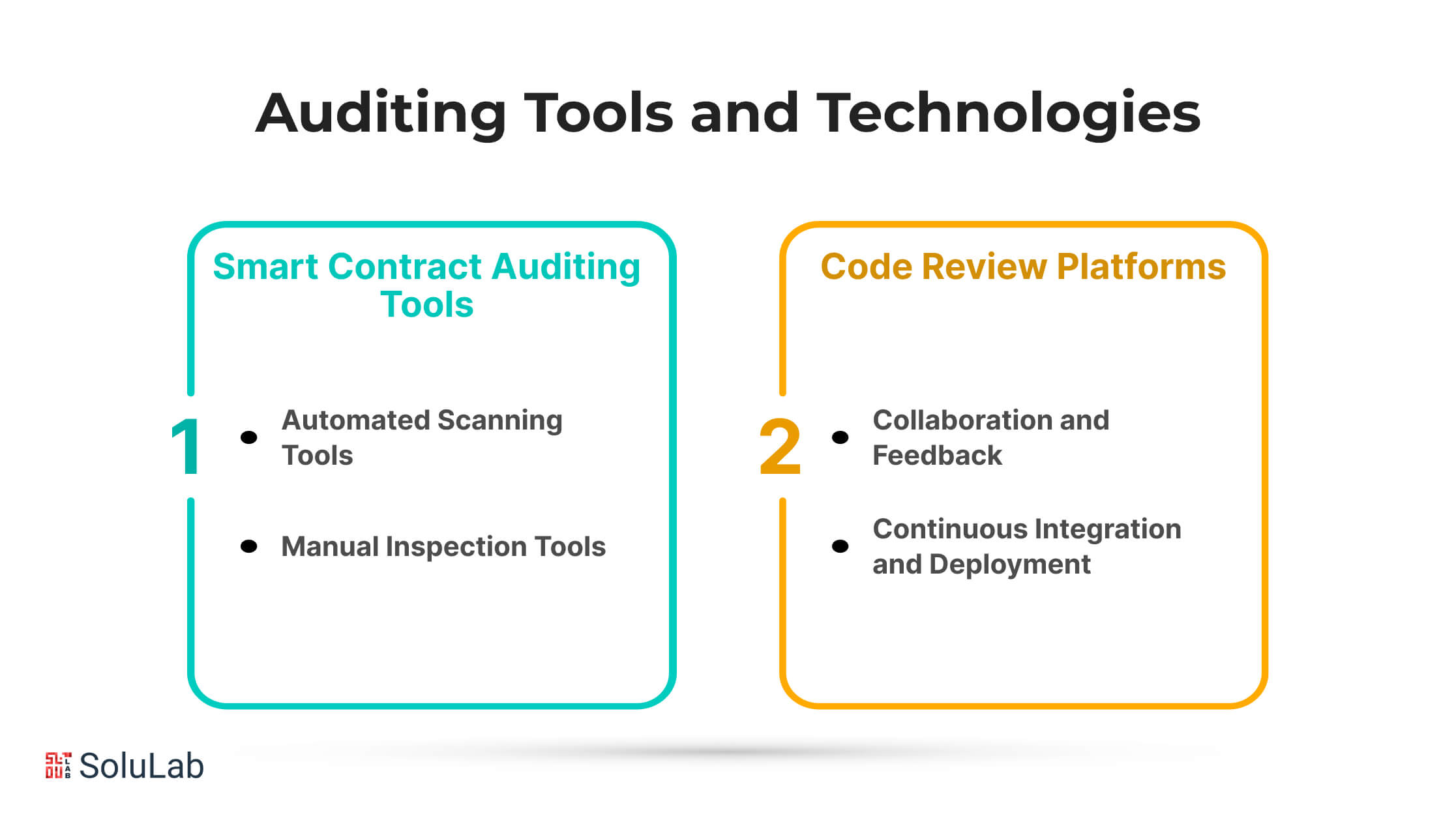
In the fast-evolving landscape of blockchain technology, ensuring the security and reliability of smart contracts has become paramount. Smart contract audits play a pivotal role in identifying vulnerabilities, mitigating risks, and ensuring the robustness of blockchain technology applications. To achieve this, various tools and technologies have emerged, providing a multifaceted approach to smart contract auditing.
A. Smart Contract Auditing Tools
1. Automated Scanning Tools
Automated scanning tools have become indispensable in the smart contract auditing process. These tools leverage advanced algorithms to conduct comprehensive scans of the contract codebase, identifying potential vulnerabilities and security loopholes.
Examples of such tools include MythX, Securify, and Slither. MythX, for instance, employs a cloud-based analysis platform to detect security issues and provide real-time feedback to developers during the coding phase.
2. Manual Inspection Tools
While automated tools offer efficiency, manual inspection tools remain crucial for a nuanced examination of smart contract code. Manual inspection involves a meticulous review by experienced auditors who delve into the intricacies of the code to identify subtle vulnerabilities that automated tools might overlook.
This process ensures a thorough evaluation of the smart contract’s logic, ensuring that it adheres to best practices. Manual tools such as Trail of Bits’ Echidna and ConsenSys Diligence’s Mythril Classic exemplify this approach.
B. Code Review Platforms
1. Collaboration and Feedback
Effective collaboration among development teams and auditors is vital for successful smart contract auditing. Code review platforms facilitate this collaboration by providing a centralized space for teams to collaborate, discuss, and resolve issues.
Tools like GitHub, GitLab, and Bitbucket enable seamless communication between developers and auditors, streamlining the auditing process. This collaborative approach ensures that all stakeholders are on the same page, leading to a more robust smart contract.
2. Continuous Integration and Deployment
Integrating smart contract auditing into the continuous integration and deployment (CI/CD) pipeline ensures that security checks are performed at every stage of development. CI/CD platforms such as Jenkins, Travis CI, and CircleCI allow developers to automate the auditing process, providing real-time feedback on code changes.
By incorporating smart contract audit tools into the CI/CD workflow, development teams can identify and rectify vulnerabilities promptly, ensuring a secure and reliable smart contract deployment.
What are the Key Components of Post-Audit Maintenance for Smart Contracts?
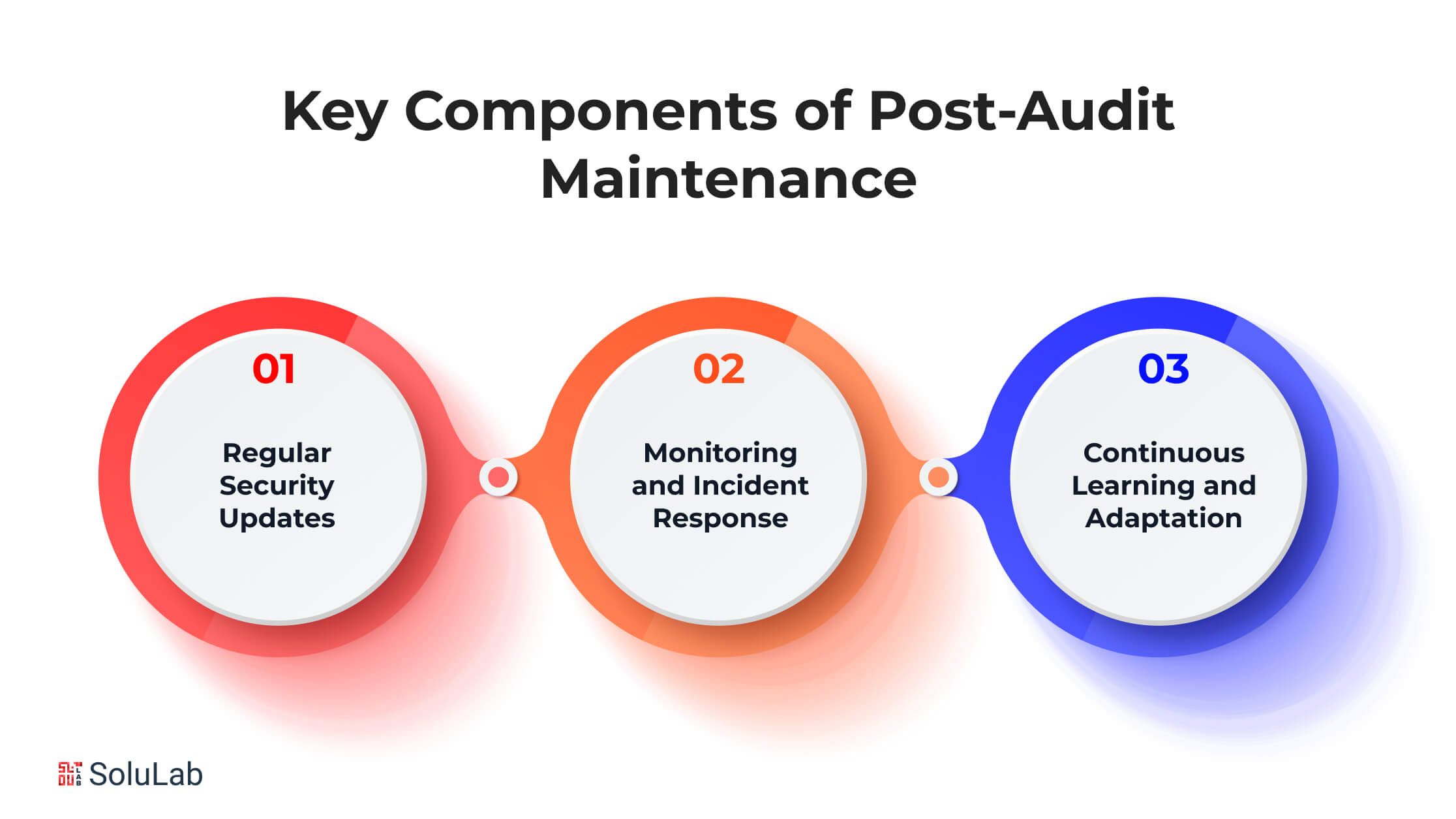
Smart contracts form the backbone of decentralized applications, ensuring the seamless execution of transactions on blockchain networks. Once a smart contract has undergone a thorough audit, it is crucial to implement best practices for post-audit maintenance to uphold its security and reliability. This section outlines essential steps for maintaining the integrity of smart contracts.
1. Regular Security Updates
Regular security updates are the cornerstone of maintaining a robust smart contract ecosystem. The dynamic nature of blockchain technology and the ever-evolving threat landscape necessitate continuous vigilance. Implementing timely security updates addresses vulnerabilities identified during the audit and bolsters the smart contract’s resistance against emerging threats.
In the realm of smart contract auditing, staying abreast of the latest developments in security protocols is paramount. Utilize cutting-edge smart contract audit tools to automate vulnerability detection and streamline the update process. By integrating these tools into the maintenance workflow, dedicated developers can proactively identify and address potential security loopholes, ensuring the ongoing integrity of the smart contract.
2. Monitoring and Incident Response
Effective monitoring and incident response mechanisms are essential for promptly addressing any anomalies that may arise post-audit. Continuous monitoring allows for real-time visibility into the smart contract’s performance and facilitates the early detection of suspicious activities or potential security breaches.
In the context of smart contract auditing, companies providing audit services should integrate robust incident response protocols into their offerings. This includes establishing clear communication channels, defining escalation procedures, and conducting regular drills to test the team’s ability to respond swiftly to security incidents. Proactive monitoring and swift incident response not only mitigate risks but also instill confidence in users interacting with the audited smart contract.
3. Continuous Learning and Adaptation
The landscape of smart contract technology is dynamic, and staying ahead of potential threats requires a commitment to continuous learning and adaptation. Developers and auditors alike must actively engage in ongoing education to stay informed about the latest security standards, best practices, and industry trends.
Smart contract companies play a pivotal role in this process by fostering a culture of continuous improvement. This involves investing in the professional development of audit teams, encouraging participation in industry conferences, and collaborating with the broader blockchain community to share insights and experiences. By embracing a mindset of continuous learning and adaptation, smart contract auditors can enhance their capabilities and provide more effective post-audit maintenance services.
How are Regulators Adapting to the Challenges Posed by Decentralized Technologies?
The rapid evolution of blockchain technology has ushered in a new era of decentralized applications, with smart contracts emerging as a cornerstone of innovation in transactional processes. As businesses and industries increasingly integrate these self-executing contracts into their operations, the regulatory landscape is undergoing a transformative phase to accommodate the unique challenges presented by decentralized technologies.
A. Current Regulatory Framework
In the ever-evolving landscape of emerging technologies, smart contracts have become a focal point of innovation, revolutionizing the way transactions are executed. As these self-executing contracts gain prominence, regulators worldwide are grappling with the task of adapting existing frameworks to address the unique challenges posed by decentralized technologies.
Governments and regulatory bodies are beginning to recognize the need for a nuanced approach to smart contract auditing. Ensuring the security, transparency, and legality of transactions executed through smart contracts requires a delicate balance between fostering innovation and protecting stakeholders.
Some jurisdictions have already taken significant strides in incorporating smart contract auditing into their regulatory frameworks, aiming to create an environment that fosters responsible adoption.
B. Future Trends and Implications
Looking ahead, the regulatory landscape is expected to witness a surge in initiatives aimed at providing clearer guidelines for smart contract auditing. As the technology matures, regulators will likely collaborate with industry experts to develop comprehensive frameworks that address the unique challenges posed by decentralized applications.
Smart contract auditing is not merely a regulatory necessity but also a strategic imperative for businesses seeking to deploy decentralized applications. Future trends may see increased collaboration between regulatory bodies, industry stakeholders, and technology experts to establish standardized best practices for auditing smart contracts.
This collaborative effort will not only enhance the credibility of decentralized applications but also foster a more secure and resilient digital ecosystem.
C. Compliance Challenges and Solutions
As with any emerging technology, smart contract adoption comes with its share of compliance challenges. Ensuring that decentralized applications comply with existing regulations while also navigating the nuances of smart contract auditing can be a complex endeavor. The decentralized and borderless nature of blockchain technology adds a layer of complexity, requiring innovative solutions to address compliance challenges effectively.
Compliance challenges in smart contract auditing may include issues related to legal recognition, data privacy, and jurisdictional disparities.
To overcome these challenges, companies may turn to specialized smart contract audit services offered by experienced firms.
Conclusion
In conclusion, the Ultimate Checklist for Smart Contract Audit serves as a comprehensive guide for ensuring the robustness and security of blockchain-based applications. As the landscape of decentralized technologies continues to evolve, the importance of smart contract auditing cannot be overstated. Companies like SoluLab have positioned themselves as leaders in the field, providing invaluable smart contract services to safeguard the integrity and functionality of blockchain projects.
Utilizing advanced smart contract audit tools, SoluLab employs a meticulous approach to auditing smart contracts, addressing vulnerabilities and potential exploits. Their expertise as a smart contract audit company is underscored by a commitment to excellence, thoroughness, and innovation in the rapidly changing blockchain ecosystem.
The checklist serves as a dynamic tool, evolving with industry standards and emerging threats, ensuring that smart contract auditing remains at the forefront of security measures. SoluLab’s dedication to staying abreast of these developments further solidifies its role as a trusted partner in the realm of smart contract security.
In essence, the synergy between the Ultimate Checklist for Smart Contract Audit and SoluLab’s smart contract audit services creates a formidable defense against potential risks. Through a strategic combination of industry-leading practices and cutting-edge tools, SoluLab stands as a reliable guardian for organizations seeking the highest level of security and reliability in their blockchain endeavors.
FAQs
1. What is a Smart Contract Audit?
A Smart Contract Audit is a comprehensive examination and review process conducted by experts to ensure the security, functionality, and reliability of a smart contract. This meticulous evaluation helps identify vulnerabilities, bugs, and potential issues in the code, ensuring a robust and secure smart contract deployment.
2. Why is Smart Contract Auditing Important?
Smart Contract Auditing is crucial to mitigate risks associated with vulnerabilities and flaws in the code. It ensures that the smart contract performs as intended, adheres to best practices, and is resistant to potential exploits, ultimately safeguarding the integrity and security of blockchain transactions.
3. How Does a Smart Contract Audit Enhance Security?
Through a thorough analysis of the smart contract code, auditing helps identify and rectify potential security loopholes. By addressing vulnerabilities, such as reentrancy attacks or code exploits, a Smart Contract Audit significantly enhances the overall security posture of the contract, preventing potential breaches.
4. What Are the Key Components of a Smart Contract Audit?
A comprehensive Smart Contract Audit covers aspects such as code correctness, security vulnerabilities, gas optimization, compliance with coding standards, and adherence to best practices in blockchain development. It involves a detailed examination of the codebase to ensure a robust and secure implementation.
5. How Can a Smart Contract Audit Tool Facilitate the Audit Process?
Smart Contract Audit Tools automate various aspects of the auditing process, offering efficiency and accuracy. These tools can scan for vulnerabilities, analyze code structure, and provide detailed reports, expediting the audit timeline and ensuring a more thorough examination of the smart contract.
6. Why Choose Professional Smart Contract Audit Services?
Engaging a reputable Smart Contract Audit Company is essential for a reliable and comprehensive audit. Professional audit services bring expertise, experience, and a structured approach to the process, ensuring that the smart contract undergoes a thorough evaluation by seasoned blockchain developers and security experts.



